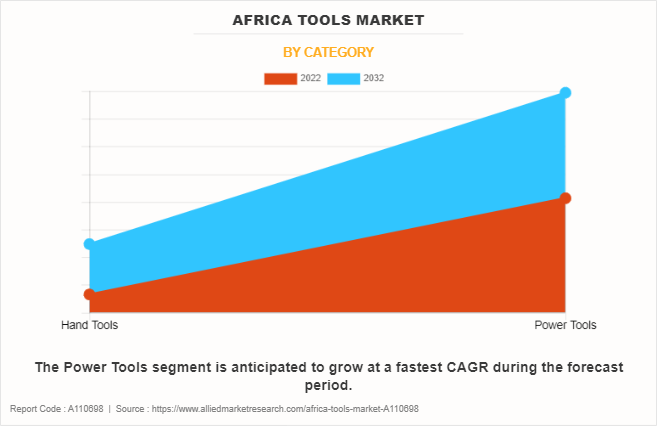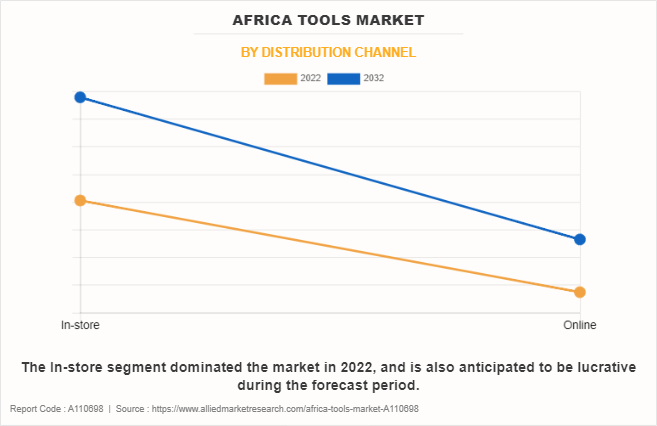The Africa tools market has been witnessing significant growth during the forecast period, owing to the ongoing urbanization and industrialization. Moreover, as people move to urban areas and new industries emerge, the demand for hand tools and power tools has witnessed a substantial growth. This urban expansion is creating a robust market for construction, automotive, and manufacturing tools. Furthermore, rise in the do-it-yourself (DIY) culture is a key factor driving the market growth. In addition, increase in emphasis on infrastructure development across various African countries is a key factor driving the market growth. Governments and private sector investments in infrastructure projects, such as roads, bridges, and buildings, have driven the demand for tools.
However, lack of standardization and quality control in the tools industry is one of the key factors restraining the market growth. Moreover, substandard and counterfeit tools flood the market, which compromises safety and hampers the reputation of genuine manufacturers and sellers. Furthermore, inadequate access to credit facilities for small & medium-sized enterprises (SMEs) restrain the market growth. In addition, high import tariffs and taxes in African countries deters the affordability of tools, particularly for individual consumers and small-scale businesses, restraining the growth of the Africa tools market.

On the contrary, as the continent's middle class continues to expand, the appetite for home improvement and DIY projects is expected to grow, creating a substantial market for hand tools, power tools, and related accessories. Moreover, the rise of e-commerce has opened new avenues for distribution. Furthermore, increase in adoption of advanced power tools & machinery has offered lucrative opportunities to the industrial and commercial end users to enhance productivity and efficiency.
The Africa tools market is segmented into category, distribution channel, and end user. On the basis of category, the market is bifurcated into hand tools and power tools. By distribution channel, it is classified into in-store and online. As per end user, it is categorized into DIY, industrial & commercial.

In addition, the integration of technology into tools is one of the key trends driving the market growth. Smart power tools and equipment, equipped with digital interfaces and automation features, are gaining popularity. Moreover, rise in environmental awareness has led to surge in demand for eco-friendly tools that are energy-efficient and produce less waste. Furthermore, Governments are expected to introduce stringent regulations to ensure the safety and quality of tools. In addition, companies are increasingly investing in new product development and R&D to create tools that are efficient, durable, and user-friendly. Moreover, they are focusing on prioritizing consumer perceptions to cater to their ever-changing demands.
Furthermore, they are experimenting with pricing models that cater to different segments of consumers, such as budget-friendly options for price-sensitive customers to premium offerings with advanced features for professionals.

The Porter's five forces analysis assesses the competitive strength of the players in the Africa tools market. These five forces include the bargaining power of suppliers, the bargaining power of buyers, the threat of new entrants, the threat of substitutes, and competitive rivalry. The bargaining power of suppliers is moderate, as international brands have a high bargaining power due to their reputation and quality, while local manufacturers offer competitive pricing. The bargaining power of buyers is high, as they have a range of options to choose from, and with the growth of e-commerce, buyers easily compare prices and features. The threat of new entrants is low, as established brands have a strong foothold, and the cost of entering the market, including compliance with quality standards, is high. The threat of substitutes is low, as there are limited substitutes for tools in applications, such as in industrial and commercial settings. The competitive rivalry is high, as several market players compete for the market share.
A SWOT analysis of the Africa tools market includes strengths, weaknesses, opportunities, and threats. The strengths include diverse product range, rise in middle class & urbanization, and opportunities for technological innovation & sustainability. The weaknesses include lack of standardization & quality control, high import tariffs in some regions, and counterfeit & substandard tools impacting market reputation. The opportunities include growth in DIY culture, expansion of e-commerce channels, and demand for eco-friendly & smart tools. The threats include competitive market with intense rivalry, stringent regulations affecting manufacturers & importers, and economic & political instability in some regions.
The key players operating in the Africa tools market include Bosch, Stanley Black & Decker, Makita, DeWalt, Hitachi Power Tools, Hilti, Ryobi, Milwaukee Tool, Tork Craft, and Gedore.
Key Benefits For Stakeholders
- Enable informed decision-making process and offer market analysis based on current market situation and estimated future trends.
- Analyze the key strategies adopted by major market players in Africa tools market.
- Assess and rank the top factors that are expected to affect the growth of Africa tools market.
- Top Player positioning provides a clear understanding of the present position of market players.
- Detailed analysis of the Africa tools market segmentation assists to determine the prevailing market opportunities.
- Identify key investment pockets for various offerings in the market.
Africa Tools Market Report Highlights
| Aspects | Details |
| Forecast period | 2022 - 2032 |
| Report Pages | 78 |
| By Category |
|
| By Distribution Channel |
|
| By End User |
|
| Key Market Players | Stanley Tools, Bosch, Ryobi, Irwin Tools, Makita, Panasonic, Hitachi, Festool, Black & Decker, Dewalt |
The Africa Tools Market is projected to grow at a CAGR of 5% from 2022 to 2032
Makita, Bosch, Panasonic, Stanley Tools, Dewalt, Black & Decker, Hitachi, Irwin Tools, Ryobi, Festool are the leading players in Africa Tools Market
1. Enable informed decision-making process and offer market analysis based on current market situation and estimated future trends.
2. Analyze the key strategies adopted by major market players in africa tools market.
3. Assess and rank the top factors that are expected to affect the growth of africa tools market.
4. Top Player positioning provides a clear understanding of the present position of market players.
5. Detailed analysis of the africa tools market segmentation assists to determine the prevailing market opportunities.
6. Identify key investment pockets for various offerings in the market.
Africa Tools Market is classified as by category, by distribution channel, by end user
Loading Table Of Content...
Loading Research Methodology...



